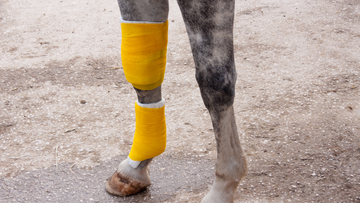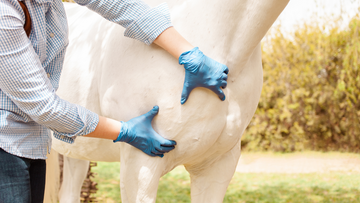Healthy joint function is essential for all animals including horses. Joint inflammation can come on suddenly and may result in short or long-term arthritis. Joint inflammation usually stems from disruption of the structure of the joints. This condition is quite common in horses, and it is important to know what is causing the inflammation to avoid permanent damage.

Why does joint inflammation occur?
Inflamed joints are usually caused by damaged cartilage and/or bone. This can be because of injury to the area, or an infection can create roughened surfaces on the bone. The movement of these surfaces and cartilage then results in inflammation. Once inflammation occurs, the synovial fluid, also known as “joint oil” because of its ability to lubricate the cartilage, will be “damaged” which is the reason for swelling, pain, and restricted movements.
Common Symptoms of Inflamed Joints
- Warm to the touch
- Visible bulging of joint capsule (bog spavin)
- Lameness at the walk or trot (most noticeable by a “head-bob” during the gaits)
- Overall stiffness
- Decreased range of motion
- Pain when joint is flexed
Diagnosis
First, seek veterinary advice. Your vet will usually start with wanting to simply observe your horse by completing a basic lameness examination. Then, he or she will perform a physical examination to detect swelling, heat, and tenderness to determine the stem of the inflamed joints.
Your vet may also do a flexion test. This is performed by the vet holding the horse’s leg tightly flexed for about a minute, then the horse is sent in a trot immediately afterward. This can make subtle lameness more visible. Some other diagnosis methods used are:
- Nerve block examination
- Radiographs
- Bone scan
- CT scan
Treatment
Treatment for inflamed joints is crucial and can lead to great results. Usually, the horse’s symptoms are lessened over time with plenty of rest and medication. The most commonly used medicines are nonsteroidal anti-inflammatory drugs (such as phenylbutazone or meclofenamic acid). Your vet may also suggest joint injections of hyaluronic acid or corticosteroids.
Massage, acupuncture, and chiropractic practices have also been used successfully for a more natural approach to relief.
To further prevent inflamed joints, or if your horse currently suffers from arthritis and joint pain, make sure to keep up with your horse’s health. Giving your horse a balanced diet, regular farrier visits, and regularly having your horse stretch can all be beneficial. It is imperative for your horse to move—perhaps some exercise like light-riding or turnout, if there is time made for proper warmups and cooldowns.
Having pasture mates your horse can be turned out with can also be wonderful for your horse. Make sure during this time your horse’s recovery and comfort are both prioritized.
Check out our equine bundle and listen to our Founder & CEO, Kat Chrysostom, talking with Dr. Carla Francheville on this very topic.





















